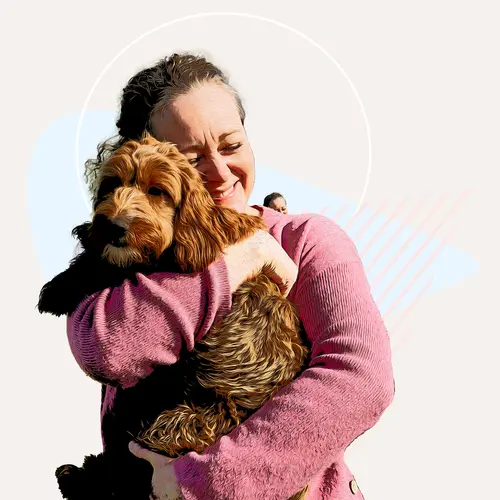Giardia is a tiny parasite that lives in the intestines. It can infect humans, mammals, and birds. Giardia infection, known as giardiasis, causes diarrhea in your dog. It's important to know that you and others who handle your dog can also get this infection.
Giardia in dogs is not a rare disease. This parasite is found worldwide. Almost 15% of dogs are infected with Giardia.
What Is Giardia in Dogs?
Giardia is a microscopic parasite that lives in your dog's intestines. From time to time, they form cysts, which your dog passes in their stool. These cysts live in the environment and will infect any animal or human who ingests them unknowingly.
There are many species of Giardia, but the most important is Giardia intestinalis (also known as Giardia duodenalis and Giardia lamblia). This is the species that infects mammals.
Giardia infects the intestines and prevents the absorption of water and nutrients. This can lead to digestion problems, weight loss, and stunted growth.
What Causes Giardia In Dogs?
Infected dogs, cats, humans, and other animals pass cysts in their stool. These cysts can remain alive and infectious for several weeks in soil. Your dog can get infected by:
- Lapping water contaminated with poop from an infected animal
- Walking through or playing in a contaminated area and then licking their paws or body
- Being in contact with poop from an infected cat or dog
- Being in a dirty animal crate or litter box (for example, during travel)
Young dogs are more likely to be infected with Giardia, so puppies younger than six months are at higher risk. Domestic pets are less likely to be infected than strays and shelter dogs.
What Are the Symptoms of Giardia In Dogs?
Giardia does not always cause symptoms. Many dogs appear healthy even though they are infected. Some dogs have intermittent symptoms and appear well most of the time.
The most common symptom is diarrhea. Your dog will pass several stools every day. The stools are bulky and smelly since they have a lot of undigested food. Diarrhea can cause weight loss and stunted growth.
Giardia infection affects large parts of the intestine. Your dog can't digest food well and becomes thin and malnourished. The frequent liquid motions can cause dehydration.
This infection can also cause vomiting in some dogs. As a result, your dog loses weight, and their coat appears dull. If the disease is not diagnosed and treated, it can cause death.
What Is the Treatment for Giardia in Dogs?
You shouldn't ignore diarrhea in your dog. Take them to your veterinarian, and they will do some tests to find the cause of diarrhea.
The traditional test for Giardia is looking at the stool under a microscope. This is quite difficult and gives poor results compared to modern tests like enzyme linked immunosorbent assay (ELISA), immunofluorescent assay (IFA), and polymerase chain reaction (PCR).
If your dog has Giardia, your veterinarian will prescribe medication. Most commonly, a five-day course of metronidazole is used. Another drug is fenbendazole.
Your dog may also need rehydration fluids and nutritional support to regain lost weight. Bathe your pet with shampoo to remove any fecal material on their fur. Ingesting the cysts in such contaminated material can reinfect your dog.
How Can You Prevent Giardia in Dogs?
Make sure your dog always has enough clean water in his bowl. Get them used to drinking only from the bowl whenever they are thirsty. Discourage them from drinking any other water.
If the water supply in your area is known to contain Giardia, use a filter that removes the cysts. Another way of making the water safe is by boiling it, which will kill the cysts.
It is important to know that your dog can be passing Giardia cysts even though they appear quite healthy. It's necessary to clean their poop as quickly as possible so that your yard and the environment are safe from this infection.
How Can You Prevent Human Giardia Infection?
Your dog's Giardia can infect you and other people who handle them. This is quite rare, as not all types of Giardia that infect dogs can survive in humans. But it's a nasty infection, and taking these precautions is wise:
- Wear gloves while gardening and cleaning your dog's poop
- Wash your hands with soap and water after handling your dog, especially before eating
- Disinfect household surfaces and any items used by your dog
Does a Dog with Giardia Need a Special Diet?
The medicine your vet prescribes will cure your dog within a few days. Special food is generally not needed. Your dog's appetite may be poor for a few days, so remember to give them small meals frequently.
Since diarrhea can cause dehydration, give your dog a lot of water. If your dog is significantly dehydrated, your veterinarian may prescribe you an oral rehydration solution.


